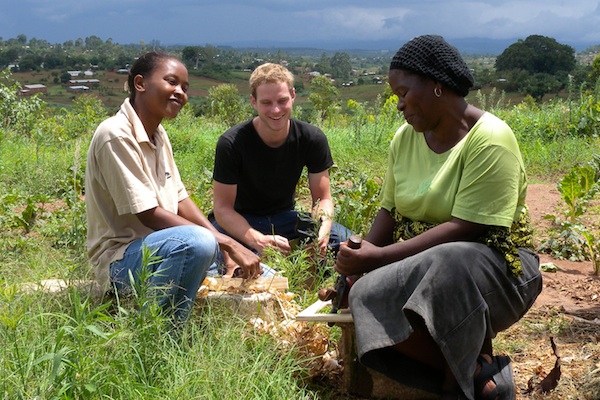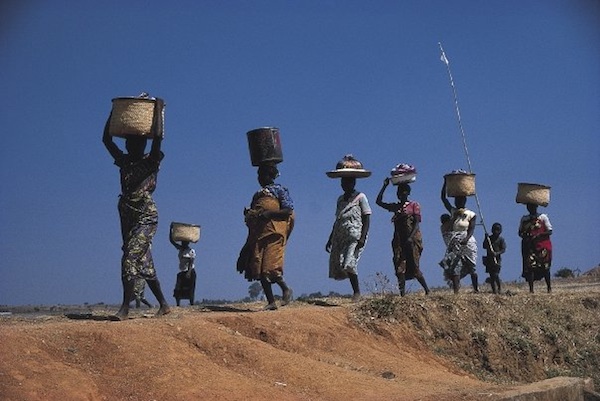
A traveller learns how to make recycled paper and gets to know the locals in Malawi. Photo courtesy of Will Turner
We at The Responsible Safari Company were excited to celebrate Responsible Tourism Week, but it also sparked some heated discussions and questions in the office about how responsible we are.
Should we be shouting it from the rooftops or just quietly getting on with what we do? Are there guidelines on how to be a responsible tourism company? Do you need to make a huge impact through your actions? And, most importantly, do you need to be awarded certificates and spend money on marketing your ‘greenness’ to be accepted into the responsible tourism club?
Is it about which list you make, which award you win, how many stars you have or green flags you wave? Do we need the above to call ourselves a responsible tourism company and will you get more green travellers because of this? We are not so sure.
Does being ‘green’ have to start with the colour of money?
Over the last few weeks we have been trying to find ways to market ourselves as a green tourism provider. Recently, we started with a Google search and were bombarded by results covering everything from sustainable travel to green products to environmental marketing companies. They were different names but all seemed to offer the same thing: boxes needed to be ticked, documents submitted and money transferred.
We are passionate about ensuring our company offers sustainable travel experiences. We love writing articles and actually enjoy the box-filling and submission policies. However, what we lack is the wads of money.
I must admit I feel a little lost as to what is worth spending money on and what isn’t. What does the industry recognise as a fantastic company to be associated with? Which stars and awards should we apply for? Which organisations can help us move forward and come up with new ways to ensure we protect our brand as a responsible tourism company? Perhaps most importantly, which companies do travellers want to see us associated with?
Reality check: responsible tourism by what standards?
I find it amusing sitting here in the dark as our electricity has once more been cut while I was trying to complete another form that asks how much power our company uses. As the printer grinds to a halt halfway through a document printed on non-recycled paper, I laugh. We use hardly any electricity since it is switched off every few days and we can’t buy recycled paper here! I don’t know whether to tick the box or cross it out.

On the long walk home. In Malawi, locals carry water and other belongings the traditional way - on their heads. Photo courtesy of Kelly White
Yes we recycle, but no we don’t recycle our glass or our plastic because there is no such facility in Malawi. Instead, every month we diligently collect our office paper waste, our plastic water containers and our kitchen tins and take them to local community projects for the children to make crafts with and for a local women’s group to make paper products with. Our plastic goes to our house staff, who take it down to the local market and resell it.
Is that the recycling policy that will get me points? Can we do more from a country like Malawi? Are we banging our heads against a brick wall about all the things we can’t do and ignoring the things we can and are doing? Can we shout about these please!?
Simply doing what we care about
The Responsible Safari Company is built out of passion in the belief that tourism can and should benefit local communities. We celebrated responsible tourism week without green-coloured flags and endorsements, but instead with a team of dedicated Malawians who are passionate about our belief in what we are doing.
Yes it is small. Yes we have a long way to go. Yes perhaps we will find we need to fork out money to show the industry all the good things we are doing. But for now, we will continue to support the communities with which we work, continue to train our staff, and continue to try and inspire our visitors to truly see Malawi! This makes us very happy to have been part of Responsible Tourism Week!

Great blog Kate and I have to agree with you that the ‘being green’ comes with a minefield of options. We have gone through very similar thought processes. Does form filling and paying for awards and accreditations make you greener or more responsible or is it just perceived? Does it mean that operators with cash can only afford to have the stars and green flags? Would it become green washing to some extend?
How important is it to the customers to have these accreditations? Are the many accreditations and awards available within the industry already becoming a minefield to clients? What marketing value do they really carry?
We still have a long way to go within the industry to find better solutions to distinguish between being truly green & responsible and green washing, and to find a solid and uniform industry label.
So for now, what more can you do than be true to your own norms & values and stick to them. Be as responsible and sustainable as you possibly can in both business and personal life. Passion is from the heart, passion is genuine. Surely that will always be more appreciated and respected than accreditations that can be bought. Well at least that is what I would hope….
Keep up to good work with or without the bells & whistles 🙂
Posted by Louise de Waal | March 28, 2011, 12:01 pmGood food for thought ah?! Well done Kate!
Posted by Chimwemwe Siyabu | March 28, 2011, 2:19 pmDear Kate. This is a great post and raises some very important issues. The small operators who make a difference in the destinations rather invest their resources (not only money but also time and knowledge) in the local community than in award applications, certification check-lists or branding. Yet, responsible tourism is not only development work. It is also a service where the client has to come to the product to consume it. Thus, without somehow spreading the word about the great work people do in the field, how can clients find out? I am sure that all the people who visit projects like yours will go back an tell all their friends and relatives. This is the best form of reference you can get – but does it bring enough business to sustain? If not, the entire development work where tourism was a tool will crumble. Far too few donors have yet understood the potential of tourism as a tool for sustainable development, and support the marketing of social enterprises (after all you are not NGOs). And this leaves us with the unpleasant situation that we can hardly scale up enough to really tap into the mainstream market. If it comes to marketing budgets, the future lies in cruise shipping, not in CBT-projects. The reason why I still engage is my passion and respect for the latter.
Posted by Marcus Bauer | March 28, 2011, 3:22 pmThanks for such a candid, soul searching review of this topic. We’ll hold another Responsible Tourism Week this year. Would it be possible to record a short skype conversation with you?
Posted by Ron Mader | March 28, 2011, 9:10 pmThank you for the above comments. More interesting questions Louise! Such a complex topic.
Marcus- i completely agree- some of the wonderful ‘eco-tourism’ initiatives we are working on do need marketing if they are to be long term stand alone projects which are able to sustain themselves. How to do this?? One thing we are trying is we have recently linked with GDF (Geotourism Development Fund) which has recognised the power tourism can have within developing countries and is trying to support the growth of small ecotourism initiatives- fascinating and looking from a business angle- economists viewpoint- very necessary!
Thank you for the responses, it is why i think we ask all these questions and raise these issues to make everyone communicate a bit more and hopefully spark new ideas for future models of tourism.
Posted by Kate | March 29, 2011, 7:43 amPS Ron – sure- skype is a bit unreliable here due to very slow internet but we can give it a shot. My skype name is domnkate
Kate
Posted by Kate | March 29, 2011, 7:51 amI think Kate is right, all to often it is about the standards set by the west that determines what your acceptability level is. Where it should be are you doing your best for your community and the planet as a whole, not if you can afford the fees based on first world income, or can you tic the right boxes.
Posted by Somchit Srimoon | April 10, 2011, 7:08 am